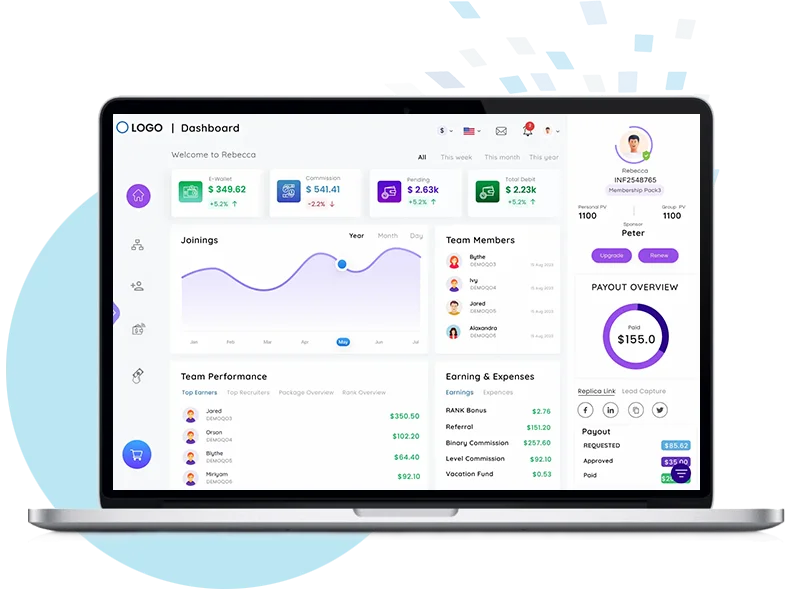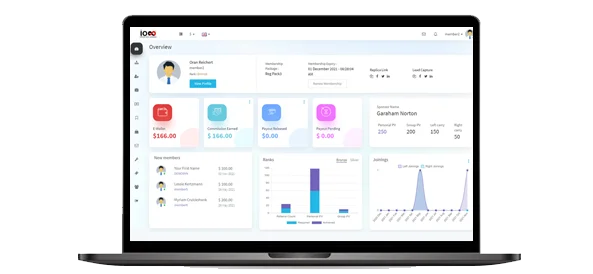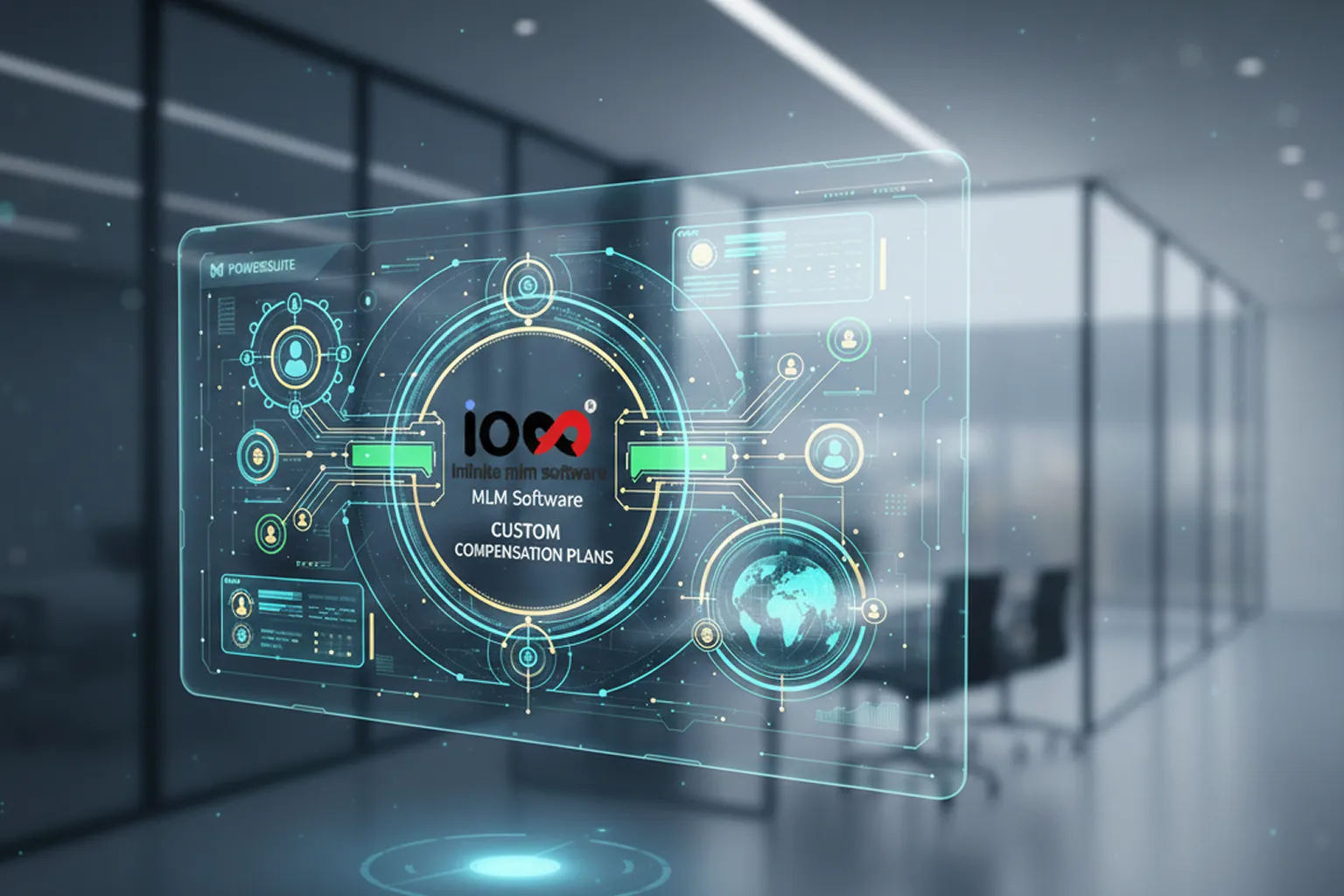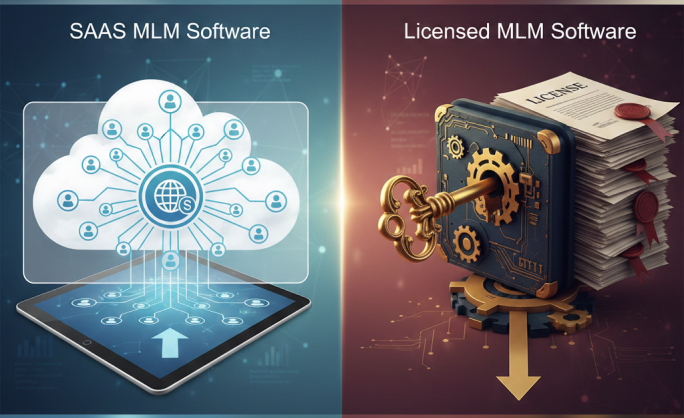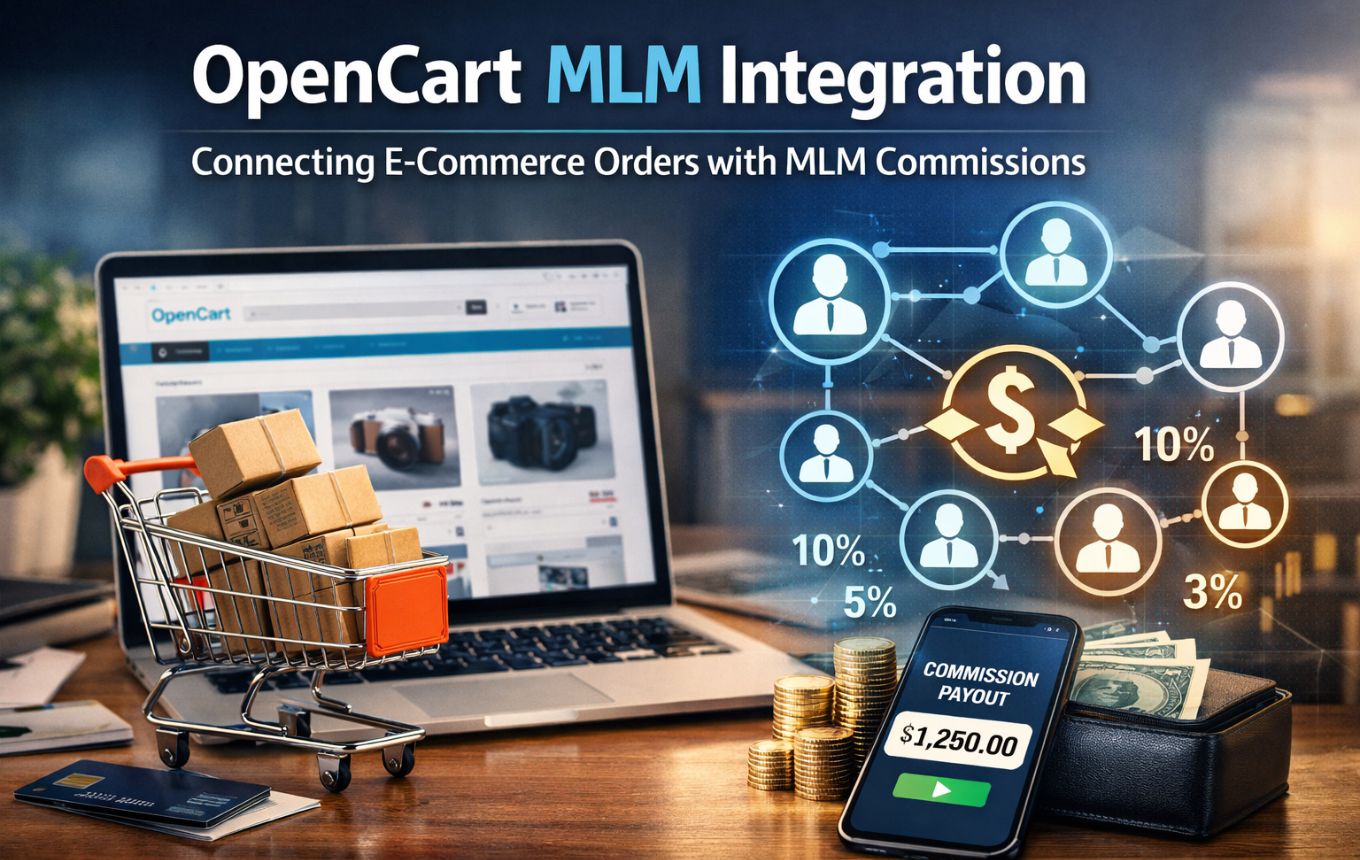MLM in Indonesia has seen significant growth over the past few decades, reflecting the country’s economy and the entrepreneurial spirit of its people.
Foreign investors in Indonesia can use MLM software to tackle money and market issues. This software lets them set up without big upfront costs. They can adjust plans and marketing to fit Indonesian tastes. MLM spreads the word quickly, reaching more people. Automated tasks save time, and partnerships with locals build trust. Plus, the software helps follow rules, reducing risks. MLM software helps foreign investors succeed in Indonesia.
Moreover, foreign investors in Indonesia’s MLM industry need to understand local rules like SIUPL. It’s a license from the Ministry of Trade that you must have to run your business legally. Getting SIUPL helps you avoid trouble and keeps your business stable. If you don’t follow the rules, you might get fined or even have to stop your business. Following the rules fosters customer trust and brand loyalty which is important for getting customers and keeping people who sell your stuff.
If you are an investor wanting to invest in MLM in Indonesia, you’ve come to the right place. Further in the blog, I’ll introduce you to the secrets you should know to create a sustainable and effective business model leading to MLM success.
 Did You Know?
Did You Know?
According to a report, in 2022, the direct selling industry in Indonesia generated approximately $1.4 billion in retail sales. Over this period, the retail sales value of the direct selling industry in Indonesia surged by over $400 million.
The Landscape of MLM in Indonesia
Unlike regular selling where you just sell products, MLM involves a group of sellers who earn money through commissions and bonuses by growing their network. Before getting into MLM, it’s important for business owners to know about Government Regulation No. 29/2021. This rule clearly sets MLM in Indonesia apart from regular retail and wholesale trading. We can help you understand what this means for your business.
Overview of popular MLM sectors in Indonesia
MLM in Indonesia includes popular sectors such as health and wellness, beauty and personal care, household products, and fashion and apparel.
Beauty and Personal Care: With a growing middle class and more money to spend, Indonesians are buying more skincare and grooming products. MLM companies in this sector benefit from cultural norms that emphasize looking good.
Household Products: Items like cleaning supplies and kitchenware are in demand due to urbanization and the need for affordable solutions. Direct selling companies profit from this trend.
Fashion and Apparel: Though not as big as other sectors, MLM companies selling fashion items are becoming more popular. Social media and celebrity endorsements influence consumer choices in this area.
| Sector | Description | Example Brand |
|---|---|---|
| Beauty and Personal Care | Indonesians prioritize skincare and grooming. Cultural norms value appearance. | Wardah, Oriflame |
| Household Products | Urbanization drives demand for affordable cleaning supplies and kitchenware. | Tupperware, Amway |
| Fashion and Apparel | Social media and celebrity endorsements influence consumer choices in fashion. | LuLaRoe, Stella & Dot |
The role of cultural and economic factors influencing MLM success
Social Networks and Relationships:
Indonesia has a collectivist culture where social networks and relationships play a crucial role in business interactions. MLM companies can make use of these social networks to recruit distributors and promote products through word-of-mouth marketing.
Entrepreneurial Spirit:
Indonesians have a strong entrepreneurial spirit, driven by the desire for financial independence and upward mobility. MLM companies tap into this mindset by offering income opportunities and flexible business models that resonate with aspiring entrepreneurs.
Trust and Reputation:
Trust is essential in Indonesian business culture, and MLM companies must build a positive reputation to succeed. This involves delivering high-quality products, providing excellent customer service, and maintaining transparency in business operations.
Economic Conditions:
Economic factors such as income levels, inflation rates, and employment opportunities influence consumer purchasing power and willingness to participate in MLM programs. MLM companies must adapt their product offerings and marketing strategies to align with prevailing economic conditions.
Legal Framework and SIUPL Requirements
The legal framework governing the operations for MLM in Indonesia includes the requirement for obtaining the Standard Indonesian Business License (SIUPL) and adherence to various business laws, including those pertaining to foreign investment.
Here’s an explanation
 SIUPL (Standard
Indonesian Business License):
SIUPL (Standard
Indonesian Business License):
The SIUPL is a mandatory license issued by the Ministry of Trade in Indonesia for all direct selling businesses, including MLM companies. It serves as proof of legal compliance and authorization to operate within the country. Obtaining the SIUPL involves meeting specific criteria set by the government, including financial stability, product quality assurance, and adherence to consumer protection regulations.
 The
Significance of SIUPL for Operating an MLM in Indonesia
The
Significance of SIUPL for Operating an MLM in Indonesia
The SIUPL is crucial for MLM in Indonesia as it ensures that companies operate within the bounds of the law and maintain transparency in their business practices. It signifies the company’s commitment to consumer protection, ethical conduct, and compliance with regulatory requirements. MLM in Indonesia faces legal repercussions, including fines, closure, or other sanctions, for operating without a SIUPL.
There are two types of SIUPL license : provisional SIUPL and permanent SIUPL
The provisional SIUPL remains valid for one year. Following its approval, the company becomes eligible to obtain a permanent SIUPL, which holds validity for five years.
 Prohibited activities
under SIUPL
Prohibited activities
under SIUPL
- Engaging in illegal business activities
- Violating environmental regulations
- Breaching labor laws
- Selling counterfeit goods
- Operating without necessary permits
- Exploiting child labor
- Deceptive advertising practices
 Indonesian Business
Laws Affecting MLM
Indonesian Business
Laws Affecting MLM
Several Indonesian business laws and regulations impact operations related to MLM in Indonesia, including those related to foreign investment:
Foreign Investment Regulations:
Indonesia has regulations governing foreign investment, including restrictions on foreign ownership and the requirement for foreign companies to establish joint ventures with local partners in certain sectors. MLM companies seeking to operate in Indonesia must comply with these regulations, which may involve partnering with local entities or obtaining special permits.
Law No. 7 of 2014:
This law concerning Trade regulates the practices of direct selling businesses in Indonesia, with specific provisions regarding the regulation of the Indonesian Chamber of Commerce and Industry.
Consumer Protection Laws:
Indonesian consumer protection laws apply to MLM companies, requiring them to provide accurate information about products, fair pricing, and transparent business practices. Violations of consumer rights can lead to legal penalties and damage to the company’s reputation.
Advertising and Marketing Regulations:
MLM companies must comply with advertising and marketing regulations set by the Indonesian government, including guidelines on truthful advertising, avoidance of misleading claims, and proper disclosure of business relationships.
Direct Selling Laws:
Specific laws and regulations govern direct selling activities in Indonesia, including licensing requirements, product registration, sales practices, and distributor recruitment. MLM companies must ensure compliance with these regulations to operate legally and maintain trust with consumers.
Establishing an MLM Business in Indonesia: A Step-by-Step Guide
as a foreign investor, involves several steps to ensure legal compliance with Indonesian laws, including obtaining the necessary permits such as the SIUPL.
Here’s a breakdown of the process:
Market Research and Planning:
-
Conduct thorough market research to understand consumer preferences, competition, and regulatory requirements.
-
Develop a comprehensive business plan outlining your product offerings, marketing strategies, and distribution network.
Incorporation and Company Registration:
-
Foreign investors commonly opt to establish a Penanaman Modal Asing (PMA), which is a limited liability company with foreign ownership.
-
Register the company with the Indonesian government and obtain a tax identification number
Appointment of Local Representative:
-
As a foreign investor, appoint a local representative or nominee director to represent the company and comply with local regulations.
Compliance with Foreign Investment Regulations:
-
Ensure compliance with Indonesian foreign investment regulations, including restrictions on foreign ownership and requirements for establishing joint ventures with local partners in certain sectors.
Application for SIUPL (Standard Indonesian Business License):
-
Prepare the necessary documentation, including business plan, financial statements, product information, and distributor agreements.
-
Submit the application for SIUPL to the Ministry of Trade or relevant authorities.
-
Comply with the requirements set by the government, including financial stability, product quality assurance, and consumer protection measures.
Obtaining Other Necessary Permits:
-
Depending on the nature of the MLM business and product offerings, obtain additional permits or licenses required by Indonesian regulations.
-
This may include product registration, distributor agreements, advertising permits, and any other relevant permits specified by local authorities.
Compliance with Indonesian Laws and Regulations:
-
Ensure ongoing compliance with Indonesian laws and regulations governing MLM operations, including consumer protection laws, advertising regulations, and direct selling regulations.
-
Implement internal controls and procedures to monitor and enforce compliance within the organization.
Training and Education:
-
Provide training and education to distributors on legal and ethical business practices, product knowledge, and compliance with regulatory requirements.
-
Establish clear guidelines and policies for distributor conduct and ensure adherence to company standards
Ongoing Monitoring and Compliance:
-
Regularly monitor and review business operations to ensure continued compliance with Indonesian laws and regulations.
-
Stay updated on changes to regulatory requirements and adjust business practices accordingly to maintain compliance.
Engage Legal and Regulatory Experts:
-
Consider engaging legal and regulatory experts familiar with Indonesian laws and regulations to assist with the establishment and ongoing compliance of the MLM business.
Strategies for MLM Success in Indonesia
To succeed in the Multi-Level Marketing (MLM) industry in Indonesia, it’s essential to tailor strategies to the local market. Indonesia’s growing economy and diverse consumer base offer great potential.
Here are some strategies curated for you:
Cultural Insights and Market Entry Strategies
There are various MLM software options available but to achieve success in MLM in Indonesia, it’s crucial to tailor strategies to fit local consumer behaviors and preferences while making use of cultural insights and forming local partnerships. Here’s how:
 Understanding Indonesian Consumer Behaviors and
Preferences
Understanding Indonesian Consumer Behaviors and
Preferences
-
Indonesians value personal relationships and trust in business interactions. Building genuine connections with customers and distributors is essential.
-
Consumers prioritize quality, value for money, and product efficacy. Emphasize these aspects in product offerings and marketing campaigns.
-
Cultural factors such as family-centric values, community ties, and religious beliefs influence purchasing decisions. Align marketing messages with these cultural values to resonate with consumers.
 Tailoring MLM Strategies
Tailoring MLM Strategies
-
Emphasize the importance of community and social networks in MLM recruitment and sales efforts. Leverage word-of-mouth marketing and encourage distributor-led events and gatherings.
-
Offer products that cater to local preferences and needs, such as health and wellness products, beauty and skin care items, and household essentials.
-
Incorporate storytelling and testimonials into marketing materials to build trust and credibility among Indonesian consumers.
-
Utilize digital marketing in MLM, including social media platforms and mobile apps, to reach a younger demographic and expand your market reach.
 Importance of Local Partnerships and Networks
Importance of Local Partnerships and Networks
-
Forge strategic partnerships with local businesses, influencers, and community leaders to gain market entry and build brand credibility.
-
Collaborate and seek advice from established MLM leaders or local distributors who have a deep understanding of the Indonesian market and can help navigate cultural nuances.
-
Establish strong distributor training programs that emphasize cultural sensitivity, product knowledge, and effective sales techniques tailored to the Indonesian context.
-
Participate in local events, trade shows, and community gatherings to raise brand awareness and connect with potential customers and distributors.
The Importance of MLM Software for Foreign Investors
To succeed in the MLM market in Indonesia,foreign investors should consider investing in MLM software.MLM software makes everything simple and easier. MLM software is essential for simplifying operations, overseeing distributors, monitoring sales, and automating processes to ensure efficient business operations.
The software facilitates effortless management of your distributor network, tracking their performance, and offering necessary support and training for their success. Moreover, MLM software empowers you to monitor sales trends, commission management, analyze data, and make informed decisions to fuel your business growth.
Sustaining and Growing MLM Operations
Sustaining and growing MLM operations in the Indonesian market requires long-term strategies focused on sustainability, product quality, customer service, and continuous training
Here’s how
Focus on Product Quality and Innovation:
-
Maintain a strong commitment to product quality and innovation to meet the evolving needs and preferences of Indonesian consumers.
-
Regularly introduce new products or product variants to keep offerings fresh and competitive in the market.
-
Conduct market research and gather feedback from distributors and customers to identify areas for product improvement or expansion.
Provide Excellent Customer Service:
-
Prioritize excellent customer service to build trust and loyalty among customers and distributors.
-
Implement efficient customer support systems, including timely response to inquiries, resolution of complaints, and assistance with product-related issues.
-
Train customer service representatives to be knowledgeable, courteous, and responsive to customer needs and concerns.
Invest in Continuous Training and Development:
-
Offer comprehensive training programs for distributors focused on product knowledge, sales techniques, and business skills.
-
Provide ongoing support and mentorship to help distributors achieve their goals and overcome challenges.
-
Incorporate training sessions on compliance with regulatory requirements, ethical business practices, and cultural sensitivity to ensure distributor adherence to industry standards.
Promote Leadership Development:
-
Identify and nurture emerging leaders within the MLM network through leadership development programs and incentives.
-
Empower leaders to mentor and support their downline distributors, fostering a culture of teamwork and collaboration.
-
Recognize and reward top performers for their achievements, motivating others to strive for success.
Embrace Digital Transformation:
-
Embrace digital tools and platforms to streamline business operations, enhance communication, and reach a wider audience.
-
Leverage social media, e-commerce platforms, and mobile apps to facilitate product promotion, sales transactions, and distributor recruitment.
-
Stay updated on digital marketing trends and adopt innovative strategies to engage with customers and distributors effectively.
Adapt to Market Dynamics:
-
Stay agile and adaptable to changing market dynamics, economic conditions, and regulatory requirements.
-
Monitor industry trends, competitor activities, and consumer preferences to identify new opportunities and adjust business strategies accordingly.
-
Maintain flexibility in product offerings, pricing strategies, and distribution channels to remain competitive in the market.
Key Challenges and How to Overcome Them
Navigating Regulatory Challenges
 Complexities of Indonesian Regulations: Indonesian regulations governing MLM operations can be
intricate and subject to change. Compliance requires thorough understanding and ongoing monitoring.
Complexities of Indonesian Regulations: Indonesian regulations governing MLM operations can be
intricate and subject to change. Compliance requires thorough understanding and ongoing monitoring.
 Ensuring Compliance: To ensure compliance, engage legal experts familiar with Indonesian laws.
Regularly review regulatory updates and adjust business practices accordingly.
Ensuring Compliance: To ensure compliance, engage legal experts familiar with Indonesian laws.
Regularly review regulatory updates and adjust business practices accordingly.
Overcoming Cultural and Operational Challenges
 Potential Cultural Misunderstandings: Cultural differences can lead to misunderstandings in
communication and business practices. Invest in cultural sensitivity training and foster open
communication channels to bridge cultural gaps.
Potential Cultural Misunderstandings: Cultural differences can lead to misunderstandings in
communication and business practices. Invest in cultural sensitivity training and foster open
communication channels to bridge cultural gaps.
 Managing Operational Hurdles: Indonesia’s diverse market presents operational challenges such as
logistics, language barriers, and varying consumer preferences. Tailor strategies to local market
nuances and establish robust distribution networks.
Managing Operational Hurdles: Indonesia’s diverse market presents operational challenges such as
logistics, language barriers, and varying consumer preferences. Tailor strategies to local market
nuances and establish robust distribution networks.
Conclusion
In summary, achieving MLM success in Indonesia requires navigating regulatory complexities, overcoming cultural and operational challenges, and embracing opportunities for growth. MLM software empowers the franchise model for mlm businesses. By prioritizing compliance, cultural sensitivity, and strategic adaptation, foreign investors can get the potential of the Indonesian MLM market and thrive amidst its dynamic landscape.

